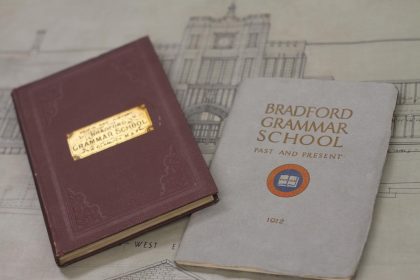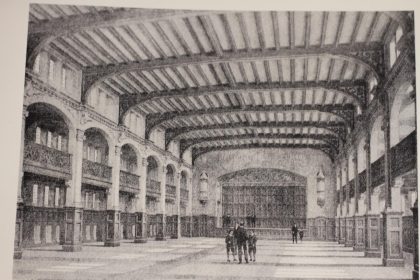Bradford Grammar School (BGS), established prior to 1548, has been a cornerstone of education in Bradford, West Yorkshire for centuries. The School’s rich history and commitment to academic excellence have made it a distinguished institution, transforming the futures of countless individuals over generations. With a motto that roughly translates to ‘do this’, BGS has always encouraged aspiration and an honest work ethic from its pupils. Our principles, high ethical standards and rich heritage provide for a lasting legacy that benefits the School community today.
Foundation and Early Years
The School’s earliest records date back to the mid-1500s. It was located near the Parish Church of St Peter, Bradford Cathedral today. In 1662, the School was re-established by Royal Charter as the Free Grammar School of Charles II at Bradford. It moved location to Manor Row in 1820 but remained relatively small, with enrolment seldom exceeding 60 pupils. Until 1871, the School offered free education to children of Anglican families, funded by donations and bequests.
The Forster Acts and Reform
Significant educational reform swept through England with the Forster Acts of 1869 and 1870, leading to the dissolution of the 1662 Charter that had previously defined the School. This change allowed our institution to use its endowments to demolish the old building and build a new, larger one on the same Manor Row site.
Under the guidance of the then Chairman of Governors, Jacob Behrens and Headmaster, William Hulton Keeling, BGS transitioned to temporary premises on Hallfield Road from 1872 to 1873. Following this time, the student body expanded, swelled in part by significant numbers of boys on state funded scholarships, and administrators and educators laid the foundation for the School’s national academic reputation. This era also saw the introduction of a broadened curriculum, a house system and the initiation of school games.
Wartime Contributions and Developments
The Great War and Second World War were challenging periods for Bradford Grammar School, as they were for so many. Dr W Edwards was a leading figure in Bradford Grammar School’s expansion and modernisation between the war years in the 1920s. Under his leadership, BGS embraced significant changes, adopting direct grant funding and acquiring new premises for the Junior School at Thornville. Its new building in Frizinghall, completed in 1939, was repurposed during the Second World War, delaying its opening as a school. Despite this obstacle, our community remained resilient. Although many pupils were evacuated, they later returned to continue their education. The School contributed to the war effort in many ways, allowing its facilities to be used for training. Beyond that, pupils and alumni actively participated in the war in various capacities.
Expansion and Modernisation
The Senior School successfully transitioned to its current location at Frizinghall in 1949, following the end of the Second World War. By the 1950s, the School had evolved into a renowned direct grant grammar school. This positive change can largely be attributed to the foresight and dedication of Douglas Hamilton, former Chairman of Governors, alongside the contributions of the local community and Government support.
Academic Excellence and Co-Educational Shift
In 1975, Bradford Grammar School adopted independent status following the abolition of the Direct Grant Scheme. This era, under the leadership of Headmaster David Smith, marked significant historical milestones, including the School joining the Assisted Places Scheme and the Junior School moving from Thornville to its current location in Clock House. Key facilities were also added around this time, including the Sports Hall, Clarkson Library and Hockney Theatre, funded through the generous support of alumni (Old Bradfordians).
The School began transitioning to co education in 1984, achieving full co education by 1999. This model demonstrates how BGS has embraced inclusivity and provided a balanced and enriching educational experience for both boys and girls. The School’s academic offerings are robust, with a wide array of GCSEs and A Level courses available. Further, the vast majority of Sixth Form students progress to higher education and degree level apprenticeships or take a gap year to broaden their horizons.
A Record of Notable Alumni
The educational legacy of Bradford Grammar School is perhaps best embodied by its alumni, who have gone on to achieve remarkable success in various fields. From John Sharp, Archbishop of York, to renowned composer Frederick Delius, and modern-day figures like artist David Hockney, statesman Denis Healy, entrepreneur Sir Ken Morrison, or triathletes Alastair and Jonny Brownlee, the School’s impact on cultural, scientific and political spheres is undeniable.
A Selective Admissions Process
Admission to Bradford Grammar School is competitive and reflective of our status as an academically selective institution. Entry at various levels is subject to performance in entrance examinations or assessments and, for Sixth Form entry, GCSE results. The School prides itself on inclusivity, offering means-tested Assisted Places to ensure talented students from all backgrounds have equal opportunities to learn.
BGS currently accepts children aged 6 to 18, but as of September 2024, this will expand to include children from age 4. This change echoes the School’s dedication to early education and offering a continuous and cohesive learning journey from the first days in the classroom through Sixth Form.
Join the Bradford Grammar School Community
Bradford Grammar School’s illustrious history spans centuries, making it one of the oldest and most respected institutions in West Yorkshire. Our educational approach is aspirational and caring, building on our rich school history while looking to the future. If you’re interested in enrolling your child, please contact us to learn more about our Junior School, Senior School and Sixth Form. We would love to be a part of your child’s educational journey.
“With a motto that roughly translates to ‘do this’, BGS has always encouraged aspiration and an honest work ethic from its pupils.”


